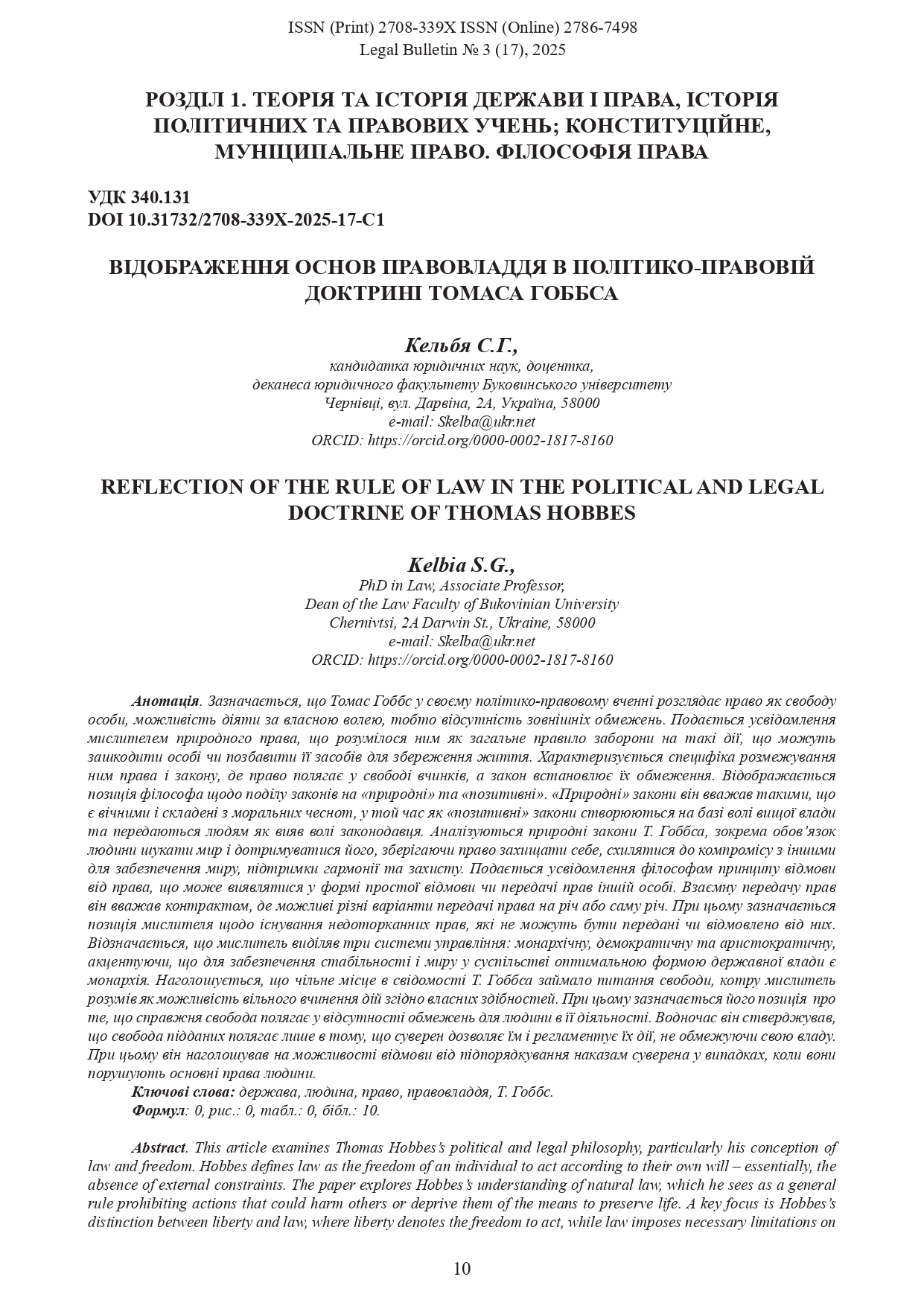Reflection of the Rule of Law in the Political and Legal Doctrine of Thomas Hobbes
DOI:
https://doi.org/10.31732/2708-339X-2025-17-C1Keywords:
state, human, law, rule of law, T. Hobbes.Abstract
This article examines Thomas Hobbes’s political and legal philosophy, particularly his conception of law and freedom. Hobbes defines law as the freedom of an individual to act according to their own will – essentially, the absence of external constraints. The paper explores Hobbes’s understanding of natural law, which he sees as a general rule prohibiting actions that could harm others or deprive them of the means to preserve life. A key focus is Hobbes’s distinction between liberty and law, where liberty denotes the freedom to act, while law imposes necessary limitations on that freedom.
The article highlights Hobbes’s categorization of laws into natural and positive. Natural laws, in his view, are eternal principles rooted in moral virtues, whereas positive laws are enacted by a sovereign authority and represent the will of the legislator. The analysis includes Hobbes’s core natural laws—such as the duty to seek peace and uphold it, the right to self-defense, and the necessity of compromise to ensure social harmony and protection. The study also discusses Hobbes’s notion of the renunciation of rights, which may occur either through simple refusal or by transferring rights to another. Mutual transfers of rights constitute a contract, which can involve either the right to an object or the object itself. Despite this, Hobbes maintains that certain inalienable rights exist—rights that cannot be transferred or surrendered under any condition. Additionally, the article outlines Hobbes’s classification of political systems into monarchy, democracy, and aristocracy, asserting that monarchy is the most effective form of government for ensuring social peace and stability. The concept of freedom is central to Hobbes’s thought, which he interprets as the capacity for action according to one’s abilities. Nonetheless, he emphasizes that the true freedom of subjects lies within the boundaries set by the sovereign, who alone holds absolute power. Importantly, Hobbes allows for disobedience in cases where sovereign commands violate fundamental human rights.
References
Hobbes Т. De Cive. London: Printed by J.C. for R. Royston, at the Angel in Ivie-Lane. 1651. 111 р.
Гоббс Т. Левіафан, або Суть, будова і повноваження держави церковної та цивільної / Пер. з англ. К.: Дух
і Літера, 2000. 606 с.
Головатий С. П. Верховенство права: у 3 кн. Кн. 1: Від ідеї
–
до доктрини. К.: Фенікс, 2006. XXXII, 623 с.
Ковалко Н. М. Правові погляди Томаса Гоббса на природу держави та суспільства: критичний аналіз.
Право і суспільство. 2017. № 2. С. 15-21.
Коваль І. М., Ратушна О. М. Проблема держави і державного управління в «Левіафані» Томаса Гоббса
(до 370-річчя від дня опублікування). Держава та регіони. Серія: Право. 2021. № 3. С. 19-23.
Колич О., Олійник В. Еволюція філософсько-правового розуміння держави. Вісник Національного універ-
ситету “Львівська політехніка”. Серія: “Юридичні науки”. 2022. № 3(35). С. 81-88.
Ніколенко В. «Левіафан», або нарис учення про державу Т. Гоббса. Грані. 2020. Т. 23. № 8. С. 26-36.
Подковенко Т. О. Індивід, суспільство і держава: грані співвідношення у концепції Томаса Гоббса. Науко-
вий вісник Ужгородського національного університету : Серія: Право. 2014. Вип. 24. Т. 4. С. 194-198.
Усов Д. В. Філософія свободи Томаса Гоббса: засадничі складові та новітні контексти. Мультиверсум.
Філософський альманах. 2021. Вип. 2(174). Том 1. C. 81-95.
Яцишин М. М. Політико-правові погляди Томаса Гоббса та Джона Локка на державну владу. Істори-
ко-правовий часопис. 2022. № 1(18). С. 14-22. DOI: https://doi.org/10.32782/2409-4544/2022-1/2

Downloads
Published
How to Cite
Issue
Section
License
Copyright (c) 2025 Кельбя С.Г.

This work is licensed under a Creative Commons Attribution 4.0 International License.




